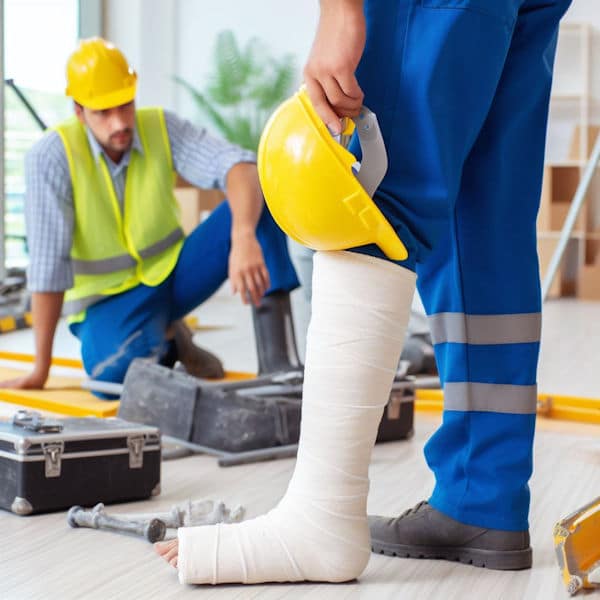
1. Slips, Trips, and Falls
One of the most common hazards in any workplace is slipping, tripping, or falling. This can be caused by wet or slippery floors, loose cords, or cluttered workspaces. To prevent this hazard, make sure to keep your workplace clean and tidy, wear non-slip shoes, and use caution when walking on uneven surfaces.
Particular places to watch out for in any workspace include stairways, entryways or exits, and high-traffic areas such as hallways. These areas are more prone to hazards due to heavy foot traffic and potential obstructions. It’s important to always have a clear path and avoid running or rushing through these areas, as well as ensuring proper lighting for visibility.
2. Repetitive Strain Injuries
If your job requires a lot of typing or other repetitive tasks, you may be at risk for developing a repetitive strain injury (RSI). These injuries can affect your hands, wrists, and arms and can cause pain and discomfort. To prevent RSIs, take breaks often, use ergonomic equipment, and stretch regularly.
In addition to preventing repetitive strain injuries, it’s important to also know how to treat them if they do occur. This can include rest, ice or heat therapy, physical therapy, and using braces or supports for affected areas. It’s important to listen to your body and seek medical attention if pain persists.
3. Chemical Exposure
Depending on your job, you may be exposed to hazardous chemicals or substances that can cause respiratory problems, skin irritations, or even cancer. To reduce your risk of chemical exposure, make sure to wear protective gear, such as gloves and masks, and avoid inhaling or ingesting any harmful substances.
In the unfortunate event that you do experience a work-related injury or illness, it’s important to know your rights and seek legal assistance if needed. This is where a work accident lawyer can be beneficial. They specialize in helping workers navigate through the complicated process of filing for workers’ compensation and ensuring they receive fair treatment and compensation for their injuries.
4. Machinery Accidents
If you work around heavy machinery, there is always a risk of getting caught in moving parts or being struck by flying debris. To prevent machinery accidents, always follow safety protocols, such as wearing protective clothing and locking out equipment before maintenance or repairs.
Heavy machinery, often used in construction, agriculture, manufacturing, and mining industries, includes a range of equipment designed to facilitate large scale tasks. Excavators, often used for digging, are one such example, equipped with a boom, dipper, and bucket to move large amounts of soil. Each of these machines has its own specific safety considerations and potential hazards, so it’s wise to know just what you’re doing before you get behind the controls.
5. Workplace Violence
Unfortunately, workplace violence is a reality for many employees. Whether it’s verbal or physical harassment, threats, or even physical assault, it’s important to be aware of the signs of workplace violence and report any incidents or concerns to your supervisor or human resources department.
6. Electrical Hazards
If you use electrical equipment or work near power lines, you may be at risk for electrical hazards, such as electrocution or electric shock. To prevent these hazards, make sure to wear protective clothing and follow all safety protocols when working with electrical equipment.
7. Ergonomic Hazards
Poor ergonomics can lead to a range of health problems, such as back pain, eyestrain, and carpal tunnel syndrome. To prevent ergonomic hazards, make sure your workspace is set up to promote good posture and minimize physical strain.
To promote good ergonomics in any job, it’s important to first assess your workspace. Make sure your desk or work surface is at the appropriate height to avoid straining your neck or shoulders. Invest in an ergonomic chair that supports your back and promotes good posture. Additionally, make sure your computer screen is at eye level to reduce eyestrain. By making small adjustments and being mindful of your posture and movements, you can prevent ergonomic hazards in any job.
8. Noise Exposure
If you work in an environment with loud or constant noise, such as a factory or construction site, you may be at risk for hearing loss or other hearing problems. To reduce your risk of noise exposure, wear earplugs or other protective gear, and limit your exposure to loud noises whenever possible.
9. Heat and Cold Stress
If you work in an environment with extreme temperatures, you may be at risk for heat stroke, hypothermia, or other heat or cold-related illnesses. To prevent heat or cold stress, dress appropriately for the weather, take frequent breaks, and stay hydrated.
10. Stress
Finally, stress can be a major hazard in any workplace. Whether it’s caused by high workloads, difficult coworkers, or other factors, excessive stress can lead to a range of physical and mental health problems. To manage stress, try to maintain a healthy work-life balance, practice self-care, and speak to a mental health professional if necessary.
No matter where you work or what you do, it’s important to be aware of potential job hazards and take steps to prevent them. By being proactive about safety, you can help ensure a healthy and happy work environment, free of injuries and accidents. Remember: safety should always be a top priority, no matter what industry you’re in.
You might also like:
- Understanding the Rules of Workers’ Compensation Benefits – What You Can and Cannot Do
- Building Confidence to Help You Reenter the World
- Health Risks of Office Work and How to Avoid Them
- Hardhats Required: 4 Things to Do after an Accident at Work
- “Just when you thought it was safe to go back in the water”…
- Although He Swept Floors Joe Knew the Key to Success
- Occupational Stress and How It Affects You
- Work Ethic Initiatives
